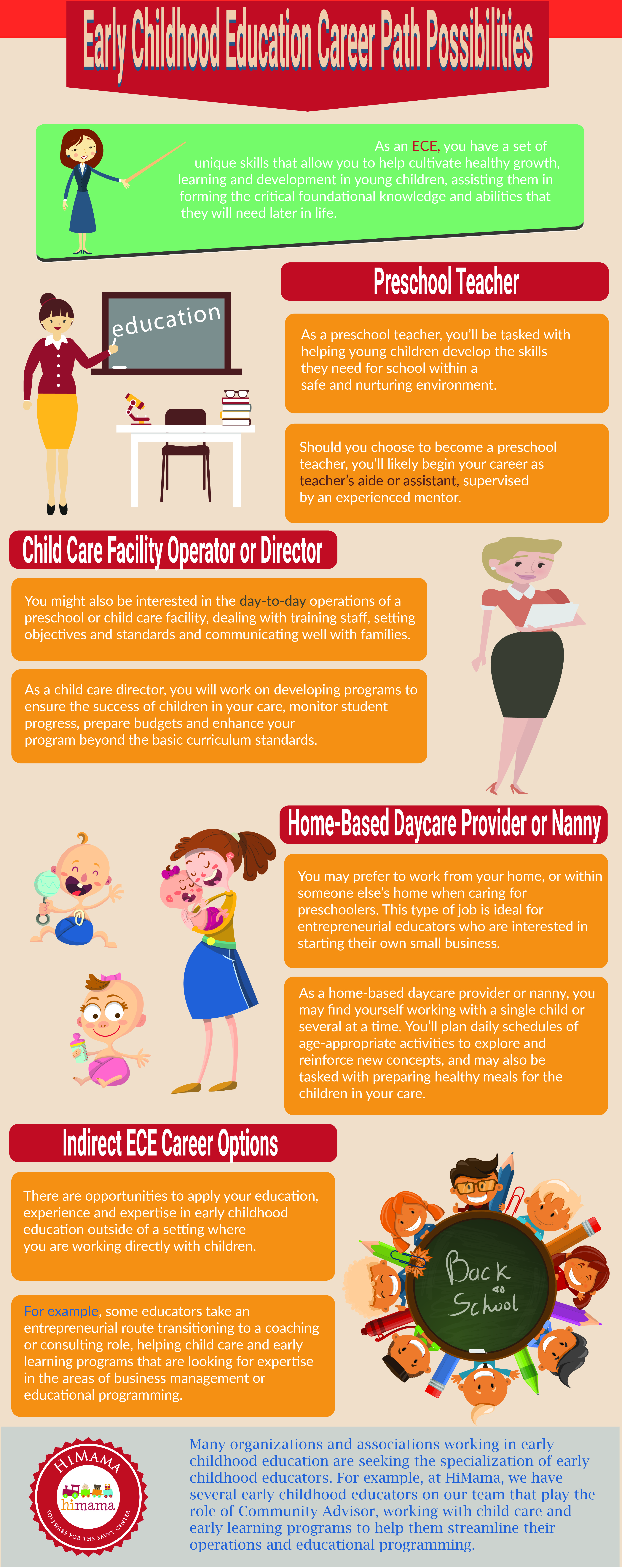Early Childhood Education Career Path Possibilities
Whether you’re currently studying early childhood education or have been working in the field for several years, you may be curious to know about your career options as an Early Childhood Educator.
If you’re considering a degree in early childhood education, you may be wondering what your career path possibilities might be. As an ECE, you have a set of unique skills that allow you to help cultivate healthy growth, learning and development in young children, assisting them in forming the critical foundational knowledge and abilities that they will need later in life.
Early Childhood Education Career Pathways
For those who have these essential skills, it is no wonder that there are a range of early childhood education career paths that can provide you with a fulfilling career that you’ll enjoy in the early childhood workforce. In this blog post, we’ll explore a few of the career pathways your degree programs, teacher certification and experience lends itself to:
Preschool Teacher
Many early childhood professionals consider the role of a preschool teacher to be a natural career path. As a preschool teacher, you’ll be tasked with helping young children develop the skills they need for school within a safe and nurturing environment.
Should you choose to become a preschool teacher, you’ll likely begin your early education career as teacher’s aide or assistant, supervised by an experienced mentor or lead teacher. As you further explore your early childhood education career path and career advancement, you may find a position as a preschool teacher in a child care center, public or private school, or another type of child care center.
Child Care Facility Operator or Director
You might also be interested in the day-to-day operations of a preschool or child care facility, dealing with training staff, setting objectives and standards and communicating well with families. You’ll likely also handle administrative duties such as maintaining records and documentation and reviewing staff performance at preschool institutions.
As a child care director, you will work on developing programs to ensure the success of children in your care, monitor student progress, prepare budgets and enhance your overall program beyond the basic curriculum standards. You’ll have a lot of responsibility, but you’ll also enjoy the satisfaction of developing outstanding early childhood programs.
Home-Based Daycare Provider or Nanny
You may prefer to work from your home, or within someone else’s home when caring for preschoolers. Many parents also feel more comfortable having their child explore learning and new concepts within the environment of their own home. This type of job is ideal for entrepreneurial educators who are interested in starting their own small business.
As a home-based daycare provider or nanny, you may find yourself working with a single child or several at a time. You’ll plan daily schedules of age-appropriate activities to explore and reinforce new concepts, and may also be tasked with preparing healthy meals for the children in your care. Like preschool teachers, you’ll keep parents up to date with the developmental progress of their child.
Indirect ECE Career Options
There are opportunities to apply your education, experience and expertise in early childhood education outside of a setting where you are working directly with children. This can be rewarding if you are looking to make a scope of impact that is wider than the number of children in a specific classroom or center. For example, some educators take an entrepreneurial route transitioning to a coaching or consulting role, helping child care and early learning programs that are looking for expertise in the areas of business management or educational programming.
Many organizations and associations working in early childhood education are seeking the specialization of early childhood educators. For example, at HiMama, we have several early childhood educators on our team that play the role of Community Advisor, working with child care and early learning programs to help them streamline their operations and educational programming. Their background makes it much easier for them to relate to the challenges and pain points that administrators and teachers experience in the classroom.
There are many other early childhood education career path possibilities out there! This is just a small portion of the types of employment you may be interested in after earning an ECE degree.
Any other thoughts on rewarding careers in early childhood education? Join the conversation at @HiMamaSocial and make sure to sign up for updates from our HiMama Blog for updates on similar content in the future!
Related Resources
- 7 Challenges of Being a Preschool Teacher
- How to Stay Current as an Early Childhood Educator
- Continuous Professional Learning for Ontario Early Childhood Educators
- 3 Reasons to Pursue an Early Childhood Educator Degree
- How to Create a Professional Portfolio for Educators
- 5 Tips to Make Your Educator Portfolio Stand Out
- What is an Early Childhood Educator?

<div><a href=”https://www.himama.com/early-childhood-education-career-path-possibilities” title=”Early Childhood Education Career Path Possibilities” alt=”Early Childhood Education Career Path Possibilities” border=”0″/><img src=”https://s3.amazonaws.com/himama2/images/infographics/early-childhood-education-career-path-possibilities.jpg” /></a><br /><br /><div> Courtesy of: <a href=”https://www.himama.com”>Himama</a></div></div>
Ron is the Co-Founder of Lillio a social-purpose business that helps early childhood educators improve learning outcomes for children.
More by Ron



